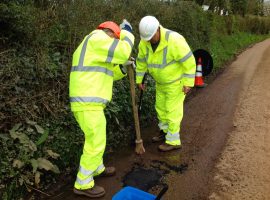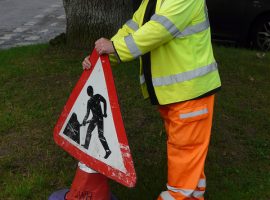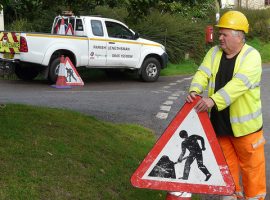Overview
What is the Road Warden Scheme?
It is a formal agreement, between Devon County Council and a town or parish council, which enables them to deliver minor works in or around the public highway.
The Road Warden Scheme allows communities to:
- organise minor works either on or off the live carriageway (see types of work below)
- carry out minor works either on the live carriageway or away from the live carriageway.
What are the benefits of the Road Warden Scheme?
- Communities are able to carry out minor works which DCC are no longer able to resource and do not have a legal responsibility to carry out.
- DCC provide third party insurance for the works.
- Free training on DCC arranged courses (see training below).
- Priority status for Highway Maintenance Community Enhancement Fund (HMCE) Fund applications.
- Access to a store of tools which are held at various locations around the county.
What type of work can be done by Road Warden volunteers?
- Pothole repairs (when they do not meet our intervention criteria).
- Clearing weeds.
- Cleaning signs.
- Cleaning drainage (gully grating).
- Cutting grass.
- Repairing finger posts.
- Cutting hedges.
- Set up a road closure for special events.
- Managing verges for wildlife
All works must be discussed, in the first instance, with the local highway neighbourhood officer. This list is not exhaustive. Work must be undertaken in line with guidance (method statements) provided by Devon County Council. Please see the ‘Details’ tab for guidance documents.
Road Wardens would not be responsible for carrying out safety repairs as this remains the responsibility of the council.
A Road Warden should:
- be nominated as suitable by the town or parish council
- be the communication link between DCC and the parish council
- agree to work within the arrangements set forward by the Road Warden agreement
- co-ordinate any minor works which are undertaken within the parish or town
- ensure that risk assessments are undertaken and are easily accessible upon DCC request.
A Road Warden volunteer should:
- be nominated as suitable by the town or parish council or similar body
- have received suitable training to carry out minor works
- agree to work within the arrangements set forward by the Road Warden.
How to get involved
Town and parish councils: If you’re interested in joining the scheme and working with Devon County Council to more effectively manage your local area call 0345 155 1004 or email hwaymain@devon.gov.uk
Individual volunteers and community groups: The Road Warden Scheme is organised via the parish or town council. Each parish or town council can have a nominated Road Warden and can be supported by local volunteers. Contact your parish or town council to see if there are any projects arranged and offer your assistance. To get the right contact details for your area please use the postcode checker below. If the parish or town council don’t have anything planned, contact Devon County Council on 0345 155 1004 or email hwaymain@devon.gov.uk and we may have something planned which you can get involved in.
FAQs
What is the difference between a Road Warden and a Road Warden’s volunteer?
The Road Warden does not necessarily carry out the works in their community although they can do so if they wish to and have undertaken the necessary training.
The Road Warden is responsible for coordinating the works that take place. This includes agreeing works with their neighbourhood highway officer, ensuring that a risk assessment of any works is carried out and ensuring that DCC’s method statements are followed.
A road warden volunteer will assist with carrying out works. The training and qualification requirements depend on the work that is planned. For example, if potholes are being repaired on the live carriageway at least one volunteer will need to have undertaken, or already hold, City & Guilds chapter 8 training.
The majority of those already signed up to the scheme combine both the role of the Road Warden with that of the volunteer.
What insurance cover does DCC provide?
In the unlikely event of a claim, DCC will cover the public liability aspect of insurance for voluntary work on the public highway or footway, providing it is undertaken in a safe manner according to DCC advice. This, for example, would cover any claims by third party as a result of works, which the county council would defend if works were done in accordance with DCC advice.
DCC will not provide any other form of insurance cover for this activity which must be undertaken at the volunteers own risk. So, for example, any damage to one’s own person, property or vehicle would not be covered. If vehicles are to be used (for example farmers) then they must ensure that the vehicle is suitably insured for any activity undertaken – if in doubt, owners should check with the vehicle’s insurer.
If a local council decide to employ a contractor to undertake any works for them then the County Council’s public liability insurance will not apply – it only applies to volunteers under this scheme.
What training needs to be done?
As a minimum we would expect those coordinating the works (the Road Warden) to have undertaken the Highway Safety Awareness e-learning module or agreed equivalent. The Highway Safety Awareness course is provided by DCC and is free of charge.
If work is carried out on the live carriageway (open to traffic) then those carrying out the works must have undertaken their SWQR Unit 2 Signing, Lighting and Guarding qualification (or equivalent) at a ratio of 1:2 (one qualified worker to 2 unqualified). This is a two day course. DCC will provide free training for 3 representatives per organisation. Special consideration will be given to requests that exceed the limit.
If road closures are being set up, for community events, then those setting up the traffic management should have undertaken the Traffic Management for Community Events course or equivalent.
DCC run a number of the SWQR Unit 2 courses throughout the year which can be attended by those wishing to carry out highway enhancement works and DCC will cover the cost. If the days and times of our prearranged training is not convenient alternative providers/locations can be investigated and the training can be applied for via the Highway Maintenance Community Enhancement Fund.
Requests for access or attendance to any of the above training should be sent via the necessary Parish or Town Council or community organisation to hwaymain@devon.gov.uk.
When can work start?
All work must be discussed and agreed with the highway neighbourhood officer in the first instance. As soon as this has been done, the training undertaken, agreement signed and risk assessment completed, the work can commence.
Does the Council offer any incentives to become involved in the scheme?
We provide free chapter 8 training, public liability insurance, access to a supply of tools which are kept at 5 locations across the county and a supply of certain materials.
What is Chapter 8 training?
Chapter 8 refers to Chapter 8 of the Traffic Signs Manual. The training teaches how to place signs to create a safe environment for workers and highway users. The course is accredited by City & Guilds. The course is run over two days and the resulting qualification is Unit 2 Signing, Lighting and Guarding of the Streetworks Qualification Register (SWQR).
DCC will provide free Chapter 8 training for up to 3 members of an organisation. Special consideration will be given to requests that exceed the limit. Failure to attend the training, once booked, or failure to provide sufficient notice of non-attendance will result in DCC recouping any incurred costs from the relevant organisation.
I am a representative of a parish / town council but struggle with finding volunteers to do community works
A number of communities, especially the larger rural parishes with small populations, struggle to find the volunteers available to assist with community projects.
There are, however, several organisations that can assist with providing volunteers and we are already working with a number of them. These include the Community Payback Service, Army Cadet Force (Western part of the County), Police Cadets and Westward Pathfinder. You can make contact with these organisations directly or we are happy to facilitate this for you.
Why should we carry out this work? We pay our council tax which means you should do it
DCC has a responsibility to keep the highway safe for the user. Work that can be carried out under the Road Warden Scheme is outside of DCC’s policies.
This additional work, through this agreement, is undertaken to keep communities looking clean and tidy and therefore appealing to visitors. DCC does not receive any funding to carry out this type of work and therefore the work is not carried out on the instruction of nor on behalf of DCC. Our highest priority is safety and our maintenance budgets are allocated accordingly. All work carried out through the Road Warden scheme is on behalf of the parish or town council or community association.
What are the responsibilities of the town or parish council once signed up to the scheme?
- All work must be discussed and agreed with the local neighbourhood highway officer prior to commencing.
- All work must be coordinated appropriately.
- Volunteers or contractors must undertake and have the necessary training requirements.
- All work must have a complete risk assessment and these must be easily accessed if required by DCC.
- Work must be recorded on the Road Warden app (launching mid-2017).
Can I apply for a Highway Maintenance Community Enhancement fund?
Yes you can. Please note that those signed up to the Road Warden Scheme will get priority application status.
Devon Highways has made a sum of money available in grants to towns, parishes and community groups in Devon. The fund has been created following the implementation of the Road Warden and Community Self Help schemes.
Initial feedback indicated that although organisations were interested in the schemes, they often found it difficult to financially support any works or find volunteers who were able to make the commitment to both the training and future projects.
The fund aims to encourage community enhancement in towns and parishes by providing the financial assistance, which may be required, as well as encouraging collaborative working, where possible, between towns, parishes and voluntary and community groups.
Initial applications should detail the type of work that will be undertaken along with the overall benefit to the community.
Apply for a Highway Maintenance Community Enhancement fund.
Details
Devon County Council will provide:
- Training and advice.
- Limited funding for materials or tools.
- Limited supply of agreed materials.
- Third party insurance cover for work carried out as agreed with the highway neighbourhood officer.
Volunteering details
When: Weekday am, weekday pm, weekends
Transport provided: No
Public transport nearby: Dependent on location of work
Disabled access: No
Training provided: Yes
Group activity: Optional
One-off opportunity: Optional
Out-of-pocket expenses paid: No
Funding and resources
Apply for a Highway Maintenance Community Enhancement Fund
Highway Maintenance Community Enhancement Fund guidance notes
Safety at street works and road works – A code of practice
Find out about access to a supply of tools which are kept at 5 locations across the county and a supply of certain materials.
Training guidance
Case studies
In response to demand to fill potholes, Devon Highways Materials Laboratory identified a product, that would provide a robust fix. Read more >
One of the initial issues facing local councils is access to appropriate signs and equipment. Read more >
Highway Self Help scheme gives town and parish councils and community self-help groups the opportunity to do small maintenance tasks. Read more >


